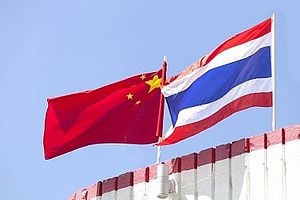Thai authorities said Monday that they will issue etiquette manuals for Chinese tourists ahead of an influx of visitors expected this week for Chinese New Year celebrations following local complaints.
According to The Bangkok Post, the manuals, prepared by the Tourism Authority of Thailand, will list some recommended behaviors such as not touching paintings, avoiding using public property as lavatories, and encouraging proper driving.
The move comes after a series of high-profile incidents involving Chinese nationals visiting Thailand. For part of February 3, Chinese tourists were banned from entering Wat Rong Khun – more popularly known as the “White Temple” and one of the most famous destinations in Chiang Rai – following complaints of inappropriate toilet usage. They were only allowed to return once tour guides agreed to assume responsibility for clearing up any mess committed by their group members. And also in Chiang Rai just last week, reports surfaced about Chinese visitors breaking off a decades old wooden stair pole at the Black House Museum – known as Baan Dam in Thai.
Meanwhile, in Chiang Mai – which will be a key center for manual distributions as it is the most popular destination for Chinese tourists – shocking photos of a Chinese tourist draping her wet underwear on chairs at Chiang Mai airport went viral on social media on February 2. According to The Post, around 90,000 visitors are expected to visit Chiang Mai over the Chinese New Year holidays this year alone.
On Saturday, government spokesman Sansern Kaewkamnerd reportedly admitted that “undesirable” elements were inevitable among such a large group of tourists but said that Thais must nonetheless maintain their spirit of hospitality.
Thailand is one of China’s largest outbound tourism destinations. According to the Tourism Authority of Thailand, around 4.6 million Chinese tourists arrived in Thailand in 2014, a minor decrease from the previous year due to political instability.
The ruling junta, which took power last May, has been trying to promote tourism – which accounts for around a tenth of the economy – in order to boost sagging economic growth. Thailand announced a three month visa fee exemption last August to stimulate Chinese tourism, and Thai authorities have attended roadshows in major Chinese cities to advertise tour routes and travel products.
The Kasikorn Research Center estimates the number of arrivals to soar by 13.5 percent to 5.25 million in 2015 as China and Thailand commemorate the 40th anniversary of their ties.

































